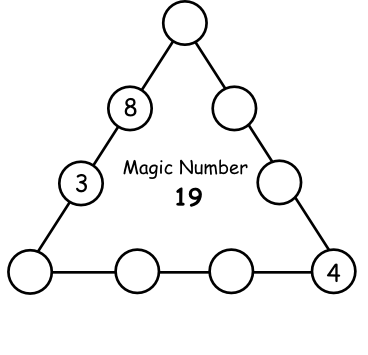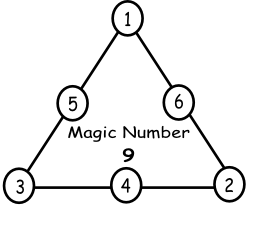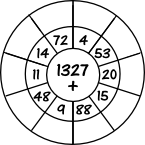- Home
- Math Puzzles
- Magic Triangle
Magic Triangle Play
Boosts Math Skills
Ready for some Triangle fun? Great way for students to build critical thinking skills while they're having fun with triangles!
Magic Triangle
Skills: Mental Addition
How To Solve:
Fill in the empty circles of the triangle so each row of the triangle adds up to the same number (Magic Number). See picture below.
So now let's try to do some triangles that are just a bit tougher. These magic triangles have four numbers on each side instead of three. But they're still worked out the same way.

So you can see we've filled out a few of the numbers for you already to make it a little easier. The magic number for this one is 19. The student's task is to fill in the missing numbers so that the sum of each side totals 19. Print the triangles here.
Make sure your students try to work it out first before giving them the answers. Print the solutions.
"Geometric: Shapes Rule!
Magic Triangles - Magic Squares - Magic Circles
So if your kids enjoyed the Magic Tringles, let's throw some other classic shapes in to get their creative mind juices flowing...
They'll probably enjoy solving some Magic Squares:
- Magic Squares - "the basics"
- Magic Square Puzzles
- Fraction Magic Squares
- Multiplication Magic Squares
- Time for some Circle Magic -
Benefits of Doing Math Puzzles
A Magic Triangle is like a puzzle and kids, and even us adults, enjoy the feeling of accomplishment as we make progress in completing it!
- Math puzzles help students who hate or are frightened of math, to have fun while developing thinking skills at the same time.
- Help increase numeracy skills and logical thinking.
- Help students with developing concentration as well as perseverance.
Doing puzzles like Magic Triangles can help students with pattern recognition, a useful skill for success in math: To solve a magic triangle, kids need to recognize patterns within the given numbers.
Math is also very systematic. Solving a magic triangle often requires a systematic approach. Kids learn to tackle problems in an organized manner by trying out different number combinations and evaluating their effects on the overall sum of each side.
Math is sometimes not black and white and kids should be encouraged that Trial and Error is a helpful tool that can be used to learn, especially in a subject like math.
Solving a magic triangle, kids also need to visualize the relationships between numbers and sides of the triangle. This spatial reasoning skill helps them mentally manipulate and rearrange elements in their minds, which is important in various fields, including mathematics, engineering, and art.
Magic triangles helps kids develop critical thinking skills by considering multiple possibilities and evaluating their validity. They learn to question assumptions, analyze information, and make informed decisions about which numbers to place in the blank spaces.
The moral of the story is by solving magic triangles kids' minds are engaged in a playful yet challenging way! These are cognitive skills that are applicable across various subjects and real-life situations
Return from magic Triangle to Learn With Math games Home
More Math Fun
Have you used triangular numbers
with your students?
Adding two and three-digit numbers with these cool Circle Addition Puzzles!
If you haven't tried these with your students yet, now's the time! Great for building mental math addition skills.




